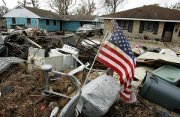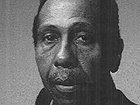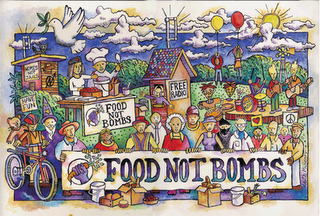Ten months after Katrina:
Gutting New Orleans
It has occurred to us that our New Orleans is looking more and more like Baghdad, writes Bill Quigley.
*Thousands of homes remain just as they were when the floodwaters receded -- ghost-like houses with open doors, upturned furniture, and walls covered with growing mold.

Not a single dollar of federal housing repair or home reconstruction money has made it to New Orleans yet.
If this is the way the US treats its own citizens, how on earth is the US treating people around the world?
We know our nation could use its money and troops and power to help build up our community instead of trying to extending our economic and corporate reach around the globe. Why has it chosen not to?
Read Professor Quigley's whole report
here.
---------------
* Bill Quigley is a human rights lawyer and professor at Loyola University New Orleans School of Law. You can reach him at Quigley@loyno.edu
Why do young men commit hate crimes?
The beginning of summer has brought a rash of violent, hate-based crimes across the country. A recent National Public Radio show explored why so many hate crime perpetrators are young men, many just teenagers. Listen to it
here.
Mark Potok, director of the Intelligence Project at the
Southern Poverty Law Center, Potok noted that only a tiny minority of people who engage in hate crimes are actually members of
hate groups.
“At the same time,” he said, “there is a lot of work done by these groups to reach out to young kids, and there are some very powerful lures. I would say that the
white power music scene is probably the chief among them.”
A recent U. S. Dept. of Justice
study found hate crimes are vastly undercounted, Potok said. While FBI statistics have shown about 10,000
a year, the real number is closer to about 190,000.
Florida gets a B-
on school food report card
Florida earned a B- for its schools' foods, says a nonprofit group that evaluates school nutrition policies.
The Center for Science in the Public Interest is based in Washington, DC. The group gave an F to 23 states and a D to eight others after evaluating school policies regarding foods and beverages sold in campus vending machines, school stores and school fund-raisers.
The evaluation excluded school meal programs.
The nation's highest grade, an A-, was awarded to Kentucky, where school vending machines are filled with bottled water and dried fruit instead of soda and snack cakes.
Report the report
here.
Some teens' idea of sport:
beating up homeless people
 Police don't know much about August Felix. No one has come forward as family, so Orange County took care of his burial in Chapel Cemetery.
Police don't know much about August Felix. No one has come forward as family, so Orange County took care of his burial in Chapel Cemetery.Five Orlando teenagers have been beating the homeless for sport.
They are now facing second-degree murder charges for allegedly beating a homeless man to death. In late March, the body of August Felix, 54, was found at an electric substation. He died 30 days later in the hospital.
"This attack was unprovoked. It never should have happened. Mr. Felix was a person in the wrong place at the wrong time," said Sgt. Rich Ring of the Orlando Police Department.
After their arrests, one of the teens said they were beating homeless people for fun.
The attack on Felix was not an isolated incident. "This group, actually, they were out there like predators looking for someone to beat on and their prey was unfortunately homeless people, and that actually led us to solve the case," Ring said.
Other homeless people told police that they had also been beaten up. The victims were able to identify a couple of the teen-agers, which led detectives to question all of the boys.
The only motivation for the attacks appears to be entertainment, Ring said.
Crimes against the homeless are on the rise nationally. See previous post
here. Michael Stoops, executive director of the
National Coalition for the Homeless, said there may be a perception among those who commit crimes against the homeless that "you can pick on homeless people and not worry about getting caught."
Read the
Orlando Sentinel story
here.
Library backs down:
homeless kids can get books
Amid objections that the ban was unfair and offers from the public to donate books to the shelters, the Porter County library board is reversing a policy prohibiting children living at homeless shelters from checking out books.
Assistant library director James Cline is apologizing for not first consulting with local shelters. Shelter directors say they're pleased that the library is willing to work out a compromise.
Read the
Chicago Sun-Times story
here.
Library cuts off books for homeless kids
Homeless children will not be allowed to check out books from an Indiana library system.

The Porter County Public Library (the county seat is Valparaiso) established the new policy after losing more than $4,000 worth of books and audio-visual materials over four to five years because temporary shelter residents failed to return them.
Ken Falk of the American Civil Liberties Union said temporary residents have the same rights as others who live in the county. "If one is a resident, then one must be treated equally by a library," Falk said.
Was this really necessary? The loss the library is complaining about is $1,000 or less a year -- not much. I'd like to know how much the library lost in materials to other, non-homeless patrons. Or are they just trying to look like they're cracking down on losing material and taking advantage of an easy target?
Read the
Chicago Sun-Times story
here.
Making it a crime to share food
with hungry poor and homeless people
The city of Orlando has moved a step closer to ending the meals for the homeless provided by the group
Food Not Bombs at Lake Eola Park.
Monday night, the city commission voted 5-2 in favor of an ordinance that would require a permit for large group meals and limit them to just twice a year. A final vote is expected on July 10.
The driving force behind the proposed ordinance seems to be horror stories of increasing crime. But I haven’t seen it, and I live about four blocks from the park. The other night, a friend and I walked around the lake and saw one guy who looked like he might be homeless. (Oh, yes,
I recognize the stereo-typing in that sentence, but perceptions of the homeless is a discussion for another day.)
And I have some questions about the ordinance, too. It would require a permit for distributing food to more than 15 people. So will the police be arresting kindergarten teachers who hand out cookies and juice at the playground? Will they count the people at family picnics?
Out of sight, out of mind seems to be the operative theme here.
Read Food Not Bombs' comments on the proposed ordinance
here.
Read the Orlando Sentinel story
here. And see previous post
here.
Meanwhile, in Las Vegas ... A city ordinance which limits handing out food in city parks is being challenged in federal court. The lawsuit was brought by a retired woman who was given a citation by city marshals because she gathered more than 25 homeless people together to hand out food. Lee Rowland, ACLU public advocate, said, "This isn't just about one person bringing a meal into the park, this is a political choice by the city to ostracize and persecute those people who are providing services that the city has failed to provide." Read more
here.
HUD to New Orleans Poor:
"Go F(ind Housing) Yourself"
By Bill Quigley*
The U.S. Department of Housing and Urban Development has announced it plans to demolish more than 5,000 public housing apartments in New Orleans. In August 2005, there were 7,381 public apartments in New Orleans. Now HUD says it has 1,000 apartments open and promises to repair and open another 1,000 in a couple of months. After months of rumors, HUD confirmed its intention to demolish all the remaining apartments.
HUD's demolition plans leave thousands of families with no hope of returning to New Orleans where rental housing is scarce and costly. In New Orleans, public housing was occupied by women, mostly working, and their children, as well as the elderly and disabled.
Demolition of public housing in New Orleans is not a new idea. When Katrina displaced New Orleans public housing residents, the Wall Street Journal reported
U.S. Congressman Richard Baker, a 10-term Republican from Baton Rouge, telling lobbyists:
"We finally cleaned up public housing in New Orleans. We couldn't do it, but God did."
Despite HUD's promise to demolish homes, the right of people to return to New Orleans is slowly being recognized as a human rights issue. According to international law, the victims of Katrina are "internally displaced persons" because they were displaced within their own country as a result of natural disaster. Principle 28 of the
Guiding Principles on Internal Displacement requires that the U.S. government recognize the human right of displaced people to return home.
Read Bill Quigley's whole report
here.
---------------
* Bill Quigley is a human rights lawyer and professor at Loyola University New Orleans School of Law. You can reach him at Quigley@loyno.edu
Do free meals fuel trouble
in downtown Orlando?

The group Food Not Bombs, which has been feeding homeless people at Lake Eola Park downtown (about four blocks from my house), is protesting outside Orlando City Hall today as the City Council deliberates a proposed ordinance that would limit group feedings.
The proposed ordinance is urged by some downtown residents and business owners who say that the homeless sometimes take over the park, as well as aggressively panhandle passers-by and bring more crime downtown. The ordinance would prohibit distribution or service of food at a large group feeding without a permit issued by the city and would limit groups to two permits per year in the same park.
If the ordinance is passed today, it must go before the City Council again
-- probably in early July -- for a second vote before it can take effect.
Read the Orl
ando Sentinel report
here. And check out an
e-mail from a city commissioner's aide to business owners near the park.
High-school students
act as 'family' at paupers' funerals
 Funeral director Ken Hardin shows the St. Xavier students where to place the casket of a homeless man near the prepared grave at River Valley Cemetery in Lousville, Kentucky.
Funeral director Ken Hardin shows the St. Xavier students where to place the casket of a homeless man near the prepared grave at River Valley Cemetery in Lousville, Kentucky.
Photo from the Louisville Courier-Journal.None of the five young men carrying the casket knew Stanley League.
With no money, and no family to claim him, League had been destined for a lonely burial in a pauper’s grave. But students from the St. Joseph of Arimathea Society
* acted as pallbearers at his funeral.
“Today, we are Stanley’s family,” their teacher said. “We are here to give him the dignity that Christ would have shown him.”
Cory Kress, 16, read from Matthew 25:34-46, in which Jesus tells the righteous they have done well by being kind to strangers, clothing the poor and feeding the hungry. “I tell you the truth, whatever you did for one of least of these brothers of mine, you did for me,” he read.
"He was born with family," said 15-year-old pallbearer Ben Freeman. "Hopefully now he can rest in peace with family."
League's funeral was the sixth that the society's members have attended. The group was oragnized at Louisville’s St. Xavier High School in May to act as pallbearers at the funerals of homeless and indigent people.
Read the
Louisville Courier-Journal report
here. And see LA homeless blog's post
here.
---------------
* St. Joseph of Arimathea was a wealthy man who gave the body of Jesus a decent burial, according to the book of Matthew 27:57-60. By the way, he's also the one who hid the Holy Grail (the chalice of the Last Supper) in Cornwall, which led to the unsuccessful quest of the knights of King Arthur to find the Grail. Read more here and here.
Estate tax survives
despite Bill Nelson's efforts
Today a key procedural vote provided a huge victory for those who oppose estate tax repeal.
The vote on a motion to proceed with consideration of estate tax repeal, which required 60 Senators to agree, failed 57-41.
Florida’s Bill Nelson was one of the renegade Democrats who voted for the motion to proceed. He is a longtime proponent of abolishing the tax.
The vote today affirms that the Senate will not pass full repeal of the estate tax. However, those seeking to make changes to the estate tax are expected to continue to work on proposals short of full repeal that could be brought up later this year. So the debate will continue ...
See previous post about the estate tax
here.
Some background you should know: Eighteen families – including the owners of Wal-Mart – that stand to save $71.6 billion in taxes are financing lobbying efforts to repeal the estate tax.
Public Citizen and
United for a Fair Economy said the families perpetrated a fraud on ordinary Americans by saying the levy constitutes an unfair "death tax." Only about 0.25 percent of Americans who die this year will leave an estate large enough to be taxed, the groups said.
Read the
Seattle Post-Intelligencer report
here. (Thanks to
What's Wrong with Orlando Politics for the link.)
In Florida, fewer than 2% of the people who died in 2003 were subject to the estate tax. Check out the report from Citizens for Tax Justice analysis, broken down by state, of IRS data
here.
Update: Check out
Social Justice's post
here.
Catchin’ up ...
I’ve had some network issues the past few days, so here’s some catch-up links ...
■ The hit-and-run grandmas pleaded not guilty to nine counts of fraud in connection with multimillion-dollar life insurance policies they took out on two homeless men who were later killed in hit-and-run accidents. Read the Los Angeles Times story here. And see previous post here.
■ The Palm Beach Post criticizes the state of Florida (and the growers) for not doing enough to protect farmworkers from exposure to pesticides. Read the editorial here. And see previous post about the possible effects of pesticide exposure here.
■ Some blogs worth checking out: The Truth About False Confessions, Anonymous Law Student, Rattler Nation (if you're interested in FAMU) and the Florida Progessive Coalition blog. If you live in Brevard, Lake, Orange, Osceola, Polk, Seminole or Volusia county, you need to read How Shall We Grow? and think about the future growth of Central Florida.
■ And a public defender blog called Just Peachy appeared and disappeared before I even got a chance to comment. You can still read excerpts at Arbitrary and Capricious (scroll down to May 29) and at Public Defender Stuff.
■ I missed the 13th juror’s one-year blogiversary!
Blacks and Latinos are often fleeced
when shopping for home loans
Black and Latino home buyers are more likely to pay high mortgage rates than white borrowers with similar credit ratings and income levels.
The
Center for Responsible Lending said either loan sellers are charging higher rates to the minority customers or those borrowers are being steered to loan sellers that specialize in higher rates.
The study found that blacks were 29% more likely to pay a high interest rate on a fixed-rate home purchase loan. A Latino borrower also was more likely to pay a high rate.
Read the study
here.
And a higher interest rate isn't the only way black and Latino home buyers are victimized. See previous post
here.
 Not a single dollar of federal housing repair or home reconstruction money has made it to New Orleans yet.
Not a single dollar of federal housing repair or home reconstruction money has made it to New Orleans yet.


